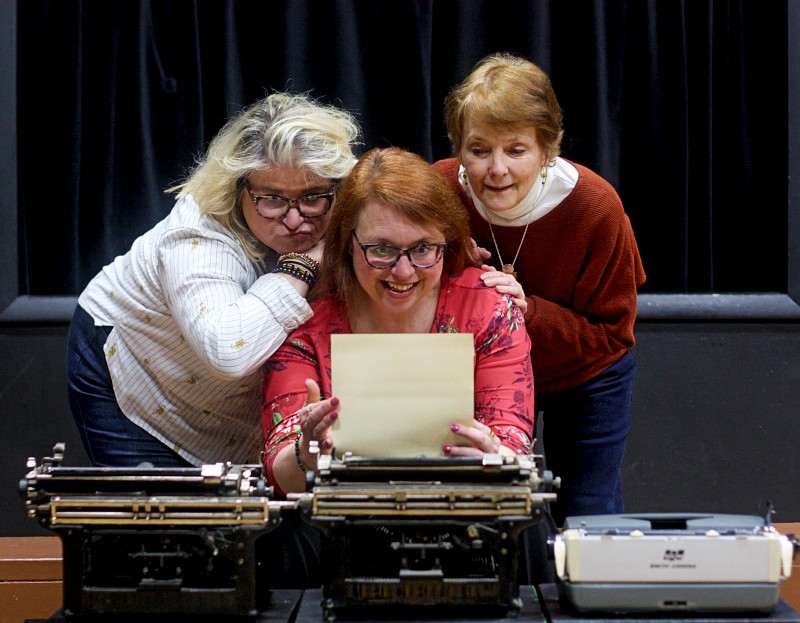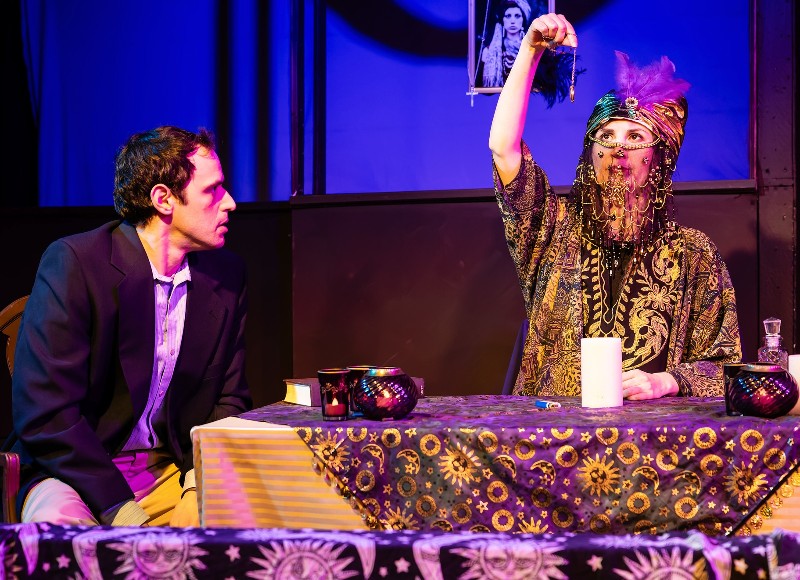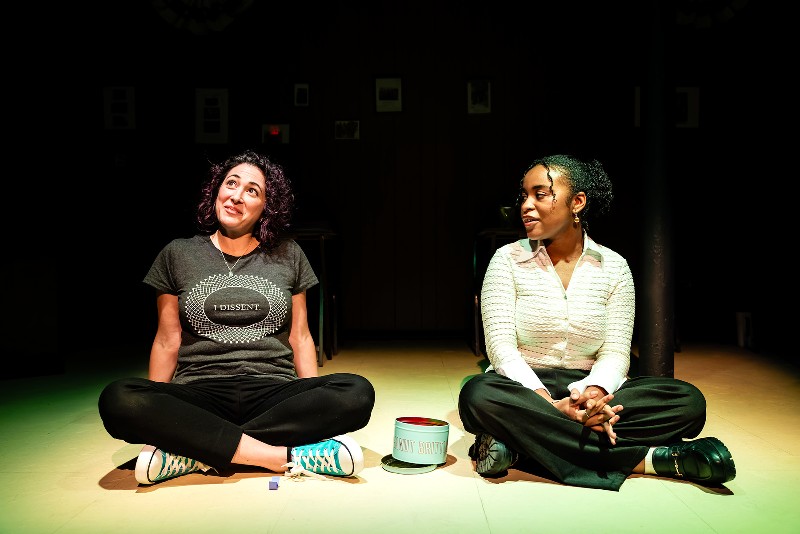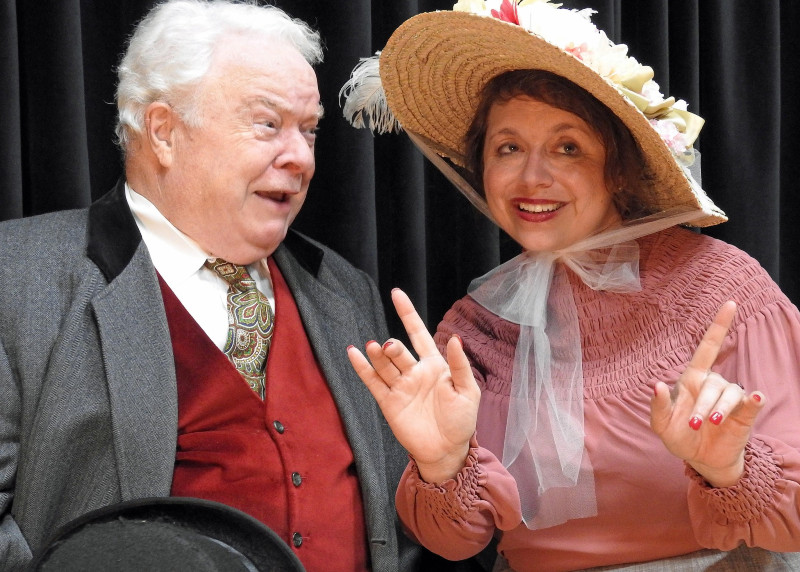"Marvin’s Room" walks a thin line between comedy and drama at Ann Arbor Civic Theatre

When the Ann Arbor Civic Theatre had to find a substitute for a previously announced play, Cassie Mann stepped in as director and suggested staging Scott McPherson’s Marvin’s Room, a play that walks that thin line between comedy and drama.
Two sisters have taken different paths in life. Bessie, now in her early 40s, left Ohio for Florida to be a caregiver for the last 20 years for her chronically ill father and an aunt confined to a wheelchair. She accepts her burden lightly but knows she’s missed a lot. Her sister Lee stayed in Ohio 20 years ago and never looked back. She is now the single mother of two teenage sons.
Bessie receives bad news from her doctor. She has leukemia and needs a bone marrow donor. Lee has to come to Florida to help her sister.
Sound heavy?
Cassie Mann calls it “one of the funniest plays about a serious subject I’ve encountered.”
U-M Presents a Swirling, Perfect Staging of Stephen Sondheim's "A Little Night Music"

It always amazes me.
Every year, the University of Michigan School of Music, Theatre & Dance is a magnet for the best, most talented musical theater stars on the horizon.
This weekend, all that training and dedication pays off in a swirling, funny, poignant, and smoothly executed production of A Little Night Music, with music and lyrics by Stephen Sondheim and book by Hugh Wheeler. Here, a large cast can show their innate talent and what they’ve learned on their way to future stardom at the Power Center for the Performing Arts.
Director Telly Leung, music director and conductor Catherine A. Walker, and choreographer and student Davey Burton Midkiff bring it all together.
A Little Night Music is, as a note says, “suggested by a film by Ingmar Bergman.” In U-M’s production, Wheeler keeps the main characters and the late 1800s Swedish setting. It’s mid-summer when the days run long, and a yearning for love is in the air. Wheeler makes room for Sondheim’s excellent music and razor-sharp lyrics, but also makes subtle changes that bend Bergman’s film in complex ways.
Encore Theatre hosts "Love Boat" vets in engaging, thoughtful "I’m Not Rappaport"

You remember The Love Boat? Sure you do.
On Saturday nights from the mid-'70s to the mid-'80s, the captain and his crew would help passengers find love, laughs, and life lessons.
Encore Theatre is taking a brief break from presenting musicals to showcase Herb Gardner’s I’m Not Rappaport, a funny, engaging, and thoughtful look at aging in the big city. It’s a perfect opportunity for a Love Boat reunion, bringing together Fred Grandy as the cruise ship purser Gopher; Ted Lange as Isaac Washington, the ship’s genial bartender; and Jill Whelan as Vicki Stubing, the captain’s daughter.
Two old men share a park bench in New York’s Central Park. Midge Carter (Lange) claims the bench for himself, a place where he can read a newspaper and hide from his obligations as a building superintendent. Nat Moyer (Grandy), a lifelong political lefty, loves to talk and wants to share his endless stories with the wary Midge. They’re an odd couple, who learn just how much they need each other.
Director Vincent Cardinal draws excellent performances from his veteran stars. They bring years of experience and a real love for the play they’re presenting. Cardinal balances physical comedy with the snappy and telling conversations that are the real heart of the play.
U-M’s take on Anton Chekhov's "Cherry Orchard" balances an awkward blend of comedy and tragedy

Is it a tragedy or a comedy?
Anton Chekhov, master short story writer and playwright, believed he had written The Cherry Orchard as a comedy, taking a jab at a rapidly fading way of life in rural Russia. When director Constantin Stanislavski directed the play for the Moscow Art Theatre in 1904, he directed a tragedy about a social order soon to be eclipsed by a very different social order.
The University of Michigan’s Department of Theatre and Drama balances the two points of view with mixed results.
In his program notes director Daniel Cantor acknowledges the shifting tone that leaves room for very different points of view.
Cantor writes, “What’s fascinating to me about The Cherry Orchard is that it contains intense contradictions: contradictions in style, theme, and action, and highly contradictory characters. It fully occupies a tragicomic perspective that is always moving, shifting, turning on a dime—whipping from the profound to the farcical, the spiritual to the absurd. And sometimes both at once.”
Six-Pack of Shorts: Ann Arbor Civic Theatre tackles David Ives' comedy anthology "All in the Timing"

When Bruce Morey was looking for a play to direct for the Ann Arbor Civic Theatre, he wanted a comedy that would engage a large cast and that wouldn’t be too time-consuming for cast members. Instead of one play, Morey found six plays in one package, David Ives’ All in the Timing.
“I wanted to do a comedy that didn’t have any heavy issues about it, just fun,” he said. “All in the Timing is a series of 10-minute plays and I wanted to explore 10-minute plays, which I think is great for community players because you can put a lot of people into these plays if you do it right. They’re shorter, so for people who work full time and have lives outside of theater, this is a great experience for them because they can come in and do a 10-minute play or a 15-minute play and maybe it’s their first experience with it. It’s self-contained and ideal for community players.”
The Ann Arbor Civic Theatre will present Ives’ six-pack of short comedies, March 14-17 at the Arthur Miller Theatre in Ann Arbor.
Director Morey and producer Nicole Arruda are working together on producing and directing.
Comic Duet: Theatre Nova's "Fortune" is a rom-com with expert timing

This has been a chilly, wet, slippery, snowy winter, so it’s a perfect time to warm up with a rom-com—especially with Valentine's Day around the corner.
For Theatre Nova's production of Deborah Zoe Laufer’s Fortune, director Carla Milarch brings two talented actors together in a comical duet. It’s a good choice for Nova's tiny, sometimes cramped space. There are some lighting special effects, but most of the fireworks come from the actors who play two lonely people looking for love.
Madame Rosa is a fortune teller, like her mother. It’s a family business and a curse. Unlike other “fortune tellers,” Madame Rosa actually can look into the past and predict the future, but she'd rather be a secretary.
When not being Madame Rosa, she’s a lonely young woman named Maude who is afraid of what she can do and afraid to give up the business and do something about her life.
One day, a desperate young man demands that Madame Rosa read his fortune. He’s an awkward young accountant who has been regularly striking out in his attempts to find love. He wants to know what his future holds and doesn’t want it sugar-coated.
Bold Conversations: Theatre Nova's "What the Constitution Means to Me" explores big issues on a small stage

New York Times theater critic Jesse Green hailed Heidi Schreck’s play What the Constitution Means to Me as “not just the best play on Broadway, but also the most important.”
Here was a theater piece that grappled with real issues while also being funny and intimate. The playwright played herself, offering her story as a template for long-simmering grievance.
Schreck’s play was not the usual Broadway fare. The set was simple, the approach was friendly and beguiling—and then, quietly, outraged. Schreck used her own story to explore what the U.S. Constitution got right, where it failed, and its impact on the lives of everyone.
The play opened on Broadway in 2018, in the wake of the Me Too movement that put a bright spotlight on male privilege, violence, and smug disregard for half of the human race.
Yes, the play is about the Constitution but its real subject is a dawning feminism and how that hallowed document has helped and hindered the freedom of women and minorities over the last 235 years.
Theatre Nova is the perfect venue for Schreck’s play. It’s a small theater in the heart of a great university town, a place where arguments about the Constitution really matter. Nova is presenting What the Constitution Means to Me through November 9.
University of Michigan Theatre takes the musical "Spelling Bee" on the road to Encore in Dexter

Can you spell collaboration?
Vincent Cardinal, a professor at the University of Michigan’s Musical Theatre Department and a board member at Dexter’s Encore Theatre, and Dan Cooney, Encore’s artistic director, see advantages for everyone in bringing a U-M production to the city, which they will do with The 25th Annual Putnam County Spelling Bee.
“The Encore, with its intimate setting and commitment to producing Broadway-worthy productions, is the ideal venue for this collaboration,” Cardinal said in a press release. “Artistic Director, Dan Cooney, and I have been talking about a collaboration for quite some time now and we are thrilled that it is finally coming to fruition!”
Coming to fruition is what The 25th Annual Putnam County Spelling Bee is all about. It’s a funny, goofy, but sensitive musical about a spelling bee. But it’s really about adolescence and the agony of growing up told through song, dance, humor, and spelling.
Cardinal is a director who gets the best out of his student casts. The spellers each have their quirks, anxieties, and troubles but for one shining moment, they get a chance to be in the spotlight. Cardinal and his cast balance the awkward humor of being young with spotlight moments that focus on the thoughts and worries of each character.
The show, with music and lyrics by William Finn and book by Rachel Sheinkin, plays on the usual cliches of nerdy young people who are not in with the cool kids. But the play then gives each speller a chance to confront the terrors of growing up and their aspirations for the future.
Near, Far, Antics Wherever They Are: Jeff Daniels’ "Diva Royale" keeps the laughs flowing at the Purple Rose Theatre

Jeff Daniels’ funny, silly, and embraceable comedy Diva Royale is—as the program announces—back by public demand at his Purple Rose Theatre in Chelsea.
Three stay-at-home Michigan moms form a close bond with their devotion to Canadian diva Celine Dion and their discontent with home life. Dion is their anchor. They have all the albums, they know all the words to all the songs, they know the heartaches she’s endured and they also love (love, love, love) the movie Titanic, where Dion’s soaring voice gives lift to the love affair of poor Jack and well-to-do Rose.
When they discover that their goddess will be performing in the Big Apple, they are ready to set out on the adventure of a lifetime. As they tell us these events happened in 2019 BC—before covid.
The play is told in a fast-paced, frenetic style that keeps the jokes, the antics, and occasionally, the stinging truth at a high pitch. If one joke fails to amuse you, the next one will have you howling, as the audience was throughout the play at the press opening.
The Mating Game: Ann Arbor Civic Theatre's "The Matchmaker" Tells a Deeper Story Beyond "Hello, Dolly!"

In 1955, playwright Thornton Wilder’s The Matchmaker became a Broadway hit that ran for 486 performances, toured successfully, became a movie, and was embraced by regional and community theaters across the country. Today, Wilder’s play is rarely performed because of Hello Dolly!
“It’s an American classic and it doesn’t get done because Hello, Dolly! gets done,” said Wendy Wright, the director of the Ann Arbor Civic Theatre’s production of The Matchmaker, which will run October 19-22 at the Arthur Miller Theatre.
Hello, Dolly! is, of course, the hit musical adaptation of Thornton Wilder’s play with music and lyrics by Jerry Herman. The song "Hello, Dolly!" was a mega-hit for Louis Armstrong before the musical was up and running, and the musical gave Carol Channing her greatest role. It, too, became a movie with Barbra Streisand and Walter Matthau.
The Matchmaker has an interesting history. It began as a one-act play in England in 1835 and was expanded into a full-length play by an Austrian playwright in 1842. In 1938, Wilder, a three-time Pulitzer Prize-winning playwright and novelist, created an American version of the story that he called The Merchant of Yonkers. It flopped. But Wilder regrouped, put the focus on Dolly, and created The Matchmaker. He won the Pulitzer for the plays, Our Town and The Skin of Our Teeth, and the novella, The Bridge of San Luis Rey.


































